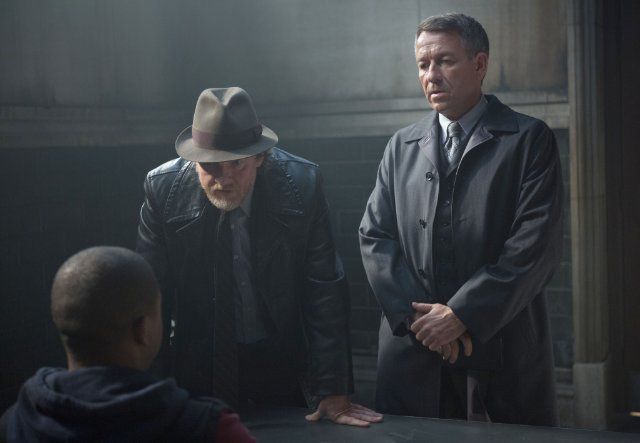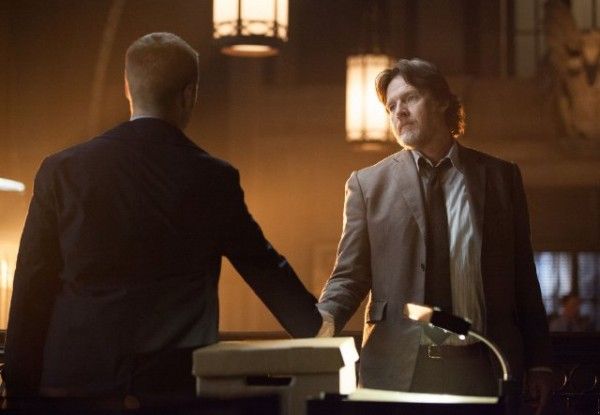The title of this week's episode of Gotham is "LoveCraft," a name rife with potential for horror and ambiguity if there ever were one. But by the end of an hour that sees previously isolated characters cross paths over and over, things are depressingly clear.
On its face, the episode is a race against the clock. After A.D.A. Harvey Dent lets slip that James Gordon had an eye witness to the Wayne murders, a gathering of mob assassins is dead set on snuffing out young Selina Kyle. From the cold open, the killers' motives and methods are spelled out through blunt force trauma. Led by a somewhat needlessly sensual assassin Larissa Diaz, they murder a Wayne Manor groundskeeper as some kind of pretense at keeping their cover. But as soon as Diaz and company lay eyes on Selina, the subterfuge goes out the window. It's as clear they'll do anything to murder the girl as it is Selina's only chance of escape is Alfred Pennyworth, who goes from English gentleman to Dirty Harry in seconds. Selina and Bruce Wayne run into the woods and toward the relative safety of the Gotham streets, and the rest of the hour is a tense collision of forces trying to either save or silence them.
But just as the assassin's slinky, blood-smearing ways are all flash with little forethought, this solid premise has trouble rising above its core idea to offer an engaging story. Part of what drags the episode down is its focus on the kids. Whether this falls on the relative inexperience of the show's youngest cast members or the generally leaden dialogue provided them by writer Rebecca Dameron is unclear. But as Selina draws the sheltered, proper Bruce through the hangouts of Gotham's street urchins, the glue that keeps them together proves an awkward fit. Maybe it's the nonsensical way that Selina blurts out offers of kisses or the equally forced manner of "They brought her back?" character Ivy Pepper. Maybe it's the continually frustrating lack of definition for Bruce as a character – always too milquetoast and lacking in drive to show even a glimmer of the hero he'll become. Maybe it's the way the central metaphor of Bruce and Selina leaping toward each other over dangerous heights is both obvious (they have trust issues, see?) and useless (but they can live on the razor's edge ... because reasons!). In any event, whenever the chase centers on these potential victims, the story grinds to a halt.
Things are much more effective whenever Alfred Pennyworth arrives on screen. Actor Sean Pertwee offers up his most confident episode yet as Wayne's manservant, and (quibbles about whether the character would shoot to kill so easily when his young charge's life is threatened aside) Pennyworth's first real scenes with Gotham's cast of borderline characters satisfy without qualification. Teamed with Harvey Bullock on the hunt, Alfred easily slips into an odd -ouple routine. Harvey calls him a valet, he corrects that he's a butler as he bleeds through his jacket. Harvey tries to beat info out of Selina's street friend, he calmly pays off the informant with an endless roll of hundreds. They're easy jokes, but they work. By the time Alfred crosses paths with scenery-chewing MVP Fish Mooney, his loving appeal to the mob captain's soft side is sweet and surprising all at once.
However, aside from these brief fireworks, Alfred's part in the episode is really a narrative dead end, as the important action of the hour belongs to Gordon. It's the detective's hunt for how exactly his case has fallen apart and what it means that matters most for the show's long-term prospects. On the one hand, Gordon learns he can't trust the supposedly incorruptible Dent. Not only did the attorney let slip the details of his witness, but he also seems willing to stop in his quest for justice when he gets too close to being burned by Gotham's cartoonishly corrupt mayor. On the other side of the coin, there's the titular villain, who may or may not have called in the hit on the kids.
That scene – the one where Gordon finally tracks down suspected Wayne killer LoveCraft – offers as clear an example as any in the episode why Gotham still fails to succeed as a series, even at its fall finale. The rest of the hour shows sign after sign meant to feel like payoff: Characters on opposite sides of the battle for the city's soul see their paths cross over and again; long-simmering plotlines about the Penguin, Falcone and Mooney's struggle to get the upper hand seem ready to boil over at any second; the corruption that Gordon has fought so hard against fights back hard enough to erase any sense of accomplishment he feels. If all these events are to have any impact, there needs to be something tangible that comes from their carefully plotted climaxes. But when Gordon faces down LoveCraft and is teased that there truly is a conspiracy behind the Wayne killings, the show pulls the plug on the low-level criminal's ravings before even one morsel of story spills out.
Rather than give the audience any sense of payoff as to what we've been watching for 10 weeks, Gotham goes for the "ka-razy" twist that Gordon is framed for foul play in LoveCraft's death. His gun being used in the killing isn't enough to get Jim arrested in a town this corrupt, but it is enough to get him transferred to Arkham Asylum as a security guard (because that's how police budgets work in this world?). By the hour's end, we're no closer to seeing a mob war blow up, or finding out whether the series has an original idea on why the Waynes were murdered, or feeling as if Bruce is on a dedicated path to scare the superstitious, cowardly lot of the city.
Instead of an earned payoff to a strong narrative, the first super-story from this show ends with more teasing. "See? It's Arkham Asylum. You know that from the comics, right? Won't that be enough to make you care about all this?" That remains to be seen.



